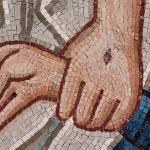Ta-Nehisi Coates‘s recent article, ‘The Case for Reparations‘ opens with scripture:
“And if thy brother, a Hebrew man, or a Hebrew woman, be sold unto thee, and serve thee six years; then in the seventh year thou shalt let him go free from thee. And when thou sendest him out free from thee, thou shalt not let him go away empty: thou shalt furnish him liberally out of thy flock, and out of thy floor, and out of thy winepress: of that wherewith the LORD thy God hath blessed thee thou shalt give unto him.”
If you haven’t yet, read Coates’s treatise–much of what appears here builds on the groundwork he lays there. Coates argues for the importance of reparations in the United States, not just for the enslavement of millions of individuals, but for the legacy of profit from disparity that has been with us ever since.
These are not issues of the past. Coates lays out our history: post-Reconstruction era labor, the Industrial Revolution, the New Deal, therise of middle class home ownership, the War on Drugs. All fraught not only with discrimination, but with broad financial profits for a nation, made at the expense of black people and other oppressed groups of color.
And it isn’t just secular institutions. In very tangible ways, Christian churches have benefited from a history of racism. Hundreds of congregations worship in churches built by enslaved people. Coates notes that certain laws mandated any property previously owned by enslaved persons “be seized and sold off by the local church, the profits used to support ‘the poor of the said parish.’” Entire denominations owe their beginnings to splits resulting from their desire to maintain slave labor.
Read the rest here















